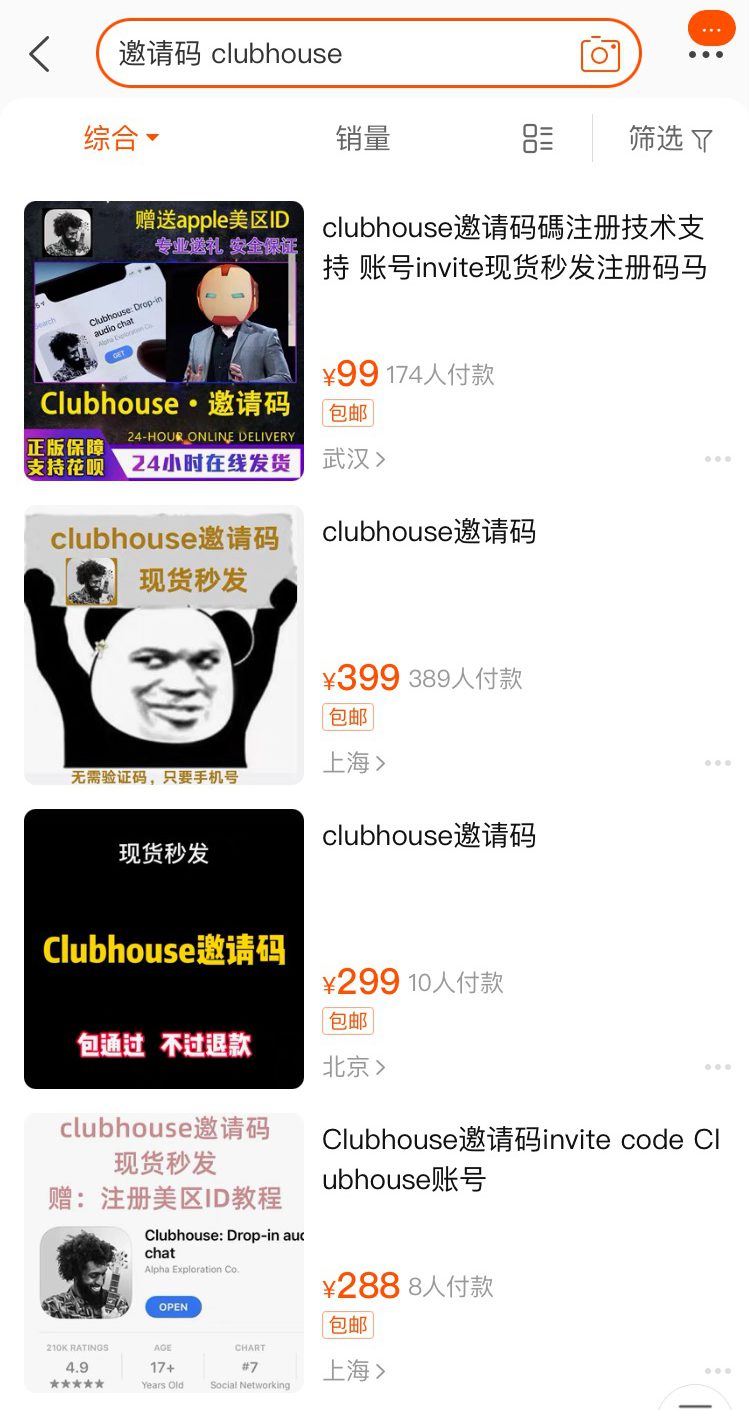Social audio app Clubhouse has been making headlines across the globe, even in China, where the invitation-only platform remains uncensored but also unavailable in the local Apple app store. Yet, Chinese users can access the app by modifying the location of their app store.
The frenzy around the app has boosted a market for the app invites, which are being sold in China on e-commerce platforms like Alibaba’s Taobao and Idle Fish for as much as RMB 400 (USD 62). Users of Chinese super app WeChat are also selling Clubhouse invitations by offering them in their Moments feeds.
So, what’s so special about Clubhouse? In short, Clubhouse, launched by tech industry veterans Paul Davison and Rohan Seth in March 2020, is an audio-based social network where users are free to join virtual chat rooms and talk after moderators of the room grant them permission. Users can also open their own rooms, either public or private, and host their own topics. Function-wise, the app is quite simple—users have a short bio page with a followers/following count, and there are not features like direct messaging or a personal feed.
However, the app recently picked up momentum after an array of personalities, such as Elon Musk and Mark Zuckerberg opened their profiles and hosted public audio rooms. The exclusivity of the platform could be also a factor to explain the growing popularity. Clubhouse is free, but users can only access the app after receiving an invite code from another user, or well, after buying one on the internet. The app is also currently only available for iPhone users.
“Influencers exchange opinions candidly, and I can hear what executives, MBA students, and top-tier consultants are doing and how they start their own businesses,” said 37-years old user Kunihiko Naito.
As of Jan 24, Clubhouse has gained 2 million users, and recently announced upcoming features to allow creators to get paid on the app through features like tipping, tickets, or subscriptions.
Read more: Behind Clubhouse, Agora is playing in the big leagues

The company providing technical support to Clubhouse—Shanghai-headquartered company Agora (NASDAQ: API)—has also seen its stock surging over 30% in the first two days of February, bolstered by Clubhouse’s sudden popularity.
In China’s internet circle, Clubhouse has ignited enthusiasm among students, entrepreneurs, investors, media workers, and others, for being a new and fresh social platform, also not yet affected by the Chinese ‘Great firewall.’ Chinese entrepreneurs such as Kai-Fu Lee, former president of Google China and CEO of Sinovation Ventures, and other personalities from big tech firms have opened audio rooms and participated in discussions about the pros and cons of Clubhouse as a social app.
Clones of Clubhouse and products with similar functions are already in the making in China. A Bilibili blogger named Bai Huancheng started a livestreaming session titled “Recreating Clubhouse in 72 hours,” which he was able to complete in 55 hours. Justin Sun, the founder of crypto platform Tron, also announced on Twitter the launch of a similar audio-based app targeting Chinese users dubbed Two, available for both iOS and Android users since February 2.
Voice-based social apps are not a new thing in China. An audio-focused dating app called “Dizhua,” was launched in 2019, but failed to become a mainstream product. Also, the format of the online chatting room reminds Chinese netizens of real-time voice and video service app YY.com, launched as early as 2012.
As of now, as more Chinese users are getting on Clubhouse, an increasing number of Chinese-speaking rooms are popping up on the app, involving a variety of topics. Among them, investors’ roundtable talks, startup founders’ experiences, media industry discussions, career consulting, cryptocurrency roundtable, and others. Even a room broadcasting China’s top news program, CCTV’s Xinwen Lianbo, got hundreds of listeners.
With growing popularity, there are more questions about the app’s future in China. Will Clubhouse follow the likes of Facebook, Twitter, and Instagram, and fall under China’s ‘Great firewall’ of internet control? Or, will a Chinese alternative hit the market and thrive? Time will tell.

